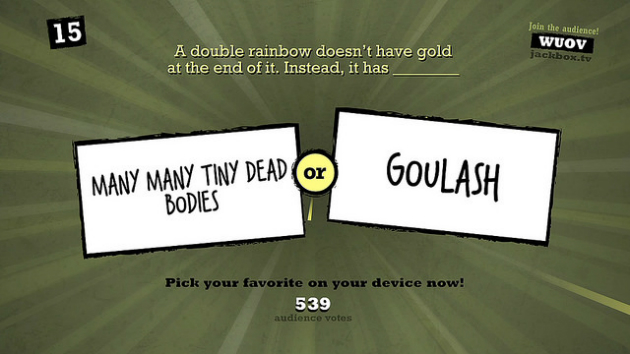Quiplash
For this critical play, I played Quiplash with my friends. Quiplash is made by Jackbox games. The default version is intended more for mature audiences due to exotic prompts, but a family friendly version is also available.
Critical formal elements of the game
In this game, I played Quiplash with 8 people total including myself. In this game, players are given two prompts to answer with their funniest response and the other players are given around 15 seconds to vote on which answer is better after viewing both answers on the screen. There are three rounds in the game. In round 1 and 2, players answer the prompt and vote as usual. However, in round 2, players can earn more points than in round 1 so that comebacks are possible. In the final round, every player in the game is given the same prompt and players vote on all of them instead of just two. Whoever gets the most points wins.
Types of fun
Fellowship
The key type of fun promoted by Quiplash is fellowship. As I was playing with my friends, we laughed so much and I took a lot of pride in having the funniest answer just because I wanted to make my friends laugh even more. The prompts given encourage players to be outrageous in their answers.
Interestingly, I think that Quiplash is a very different game depending on the social dynamics of the players. I played two full games of quiplash: the first was with just my very close friends and the second had one additional person who was in our dorm that we had never met before. In the first game, none of us held back and answers that were most popular tended to be the more graphic answer or the answer that played best to group dynamics. For example, after an answer in round 1 referenced an inside joke about my friend Jared’s personality, the next round had multiple answers discuss that same trait of Jared’s personality. However, once a new person entered the game, I noticed that people toned down their answers and made less inside jokes. Thus, it seems that for this game to be very, very fun, it is necessary for players to already have some level of camaraderie with one another.
Expression
A secondary type of fun facilitated by Quiplash is expression. Players leverage their creativity in this game in order to make the other players laugh. The game encourages creativity through its skillfully-created prompts and the fact that players write their responses themselves.
Comparison to other games
This game is similar to other judging games like Apples to Apples and Cards Against Humanity. I love Quiplash! There are a few ways in which this game stands out from the others.
Improved medium
This game is played primarily on players’ individual phones and TVs instead of with physical cards. Players type their responses on their phones and during voting, a realistic-sounding robotic narrator reads the prompt as the cards are displayed below. This makes the game more interactive and accessible to a larger group of players compared to a card-based game like Apples to Apples or Cards Against Humanity, where players depend on the judge to read the prompt answers. In these card-based judging games, if the judge reads some cards more enthusiastically than others, those will seem like worse responses.
Custom responses
Because players type their responses on their phones instead of picking a pre-made response, they are able to be more creative that in card-based judging games. In the long term, this game will age better because players’ responses can keep up with the times. Additionally, players can more easily appeal to the inside jokes and preferences of the room.
Everyone participates
In Quiplash, since responses are compared 1:1 instead of 8 cards being voted on by one judge, more people can participate in each round. Players exist in each round as both a phrase contributor and a judge, which creates a more dynamic game.
Handling of abuse
In this game, players self-regulate how extreme their answers should be based on the perceived sensitivities of other players. Thus, this game is most effective at not offending other players when players already have strong relationships with one another.
Improvements
Timing
The major way that Quiplash could be improved is having longer rounds. Multiple times throughout the game, if players got slightly distracted by a conversation or something else, they would miss the time to vote or the time to generate an answer.
Norm-setting
Quiplash is great for friend groups that already really understand each other, but for newer groups of friends, it can be awkward to know who is comfortable with what. It would be helpful for Quiplash to introduce some sort of norms quiz at the beginning of the game so that people could specify what they are comfortable with.




